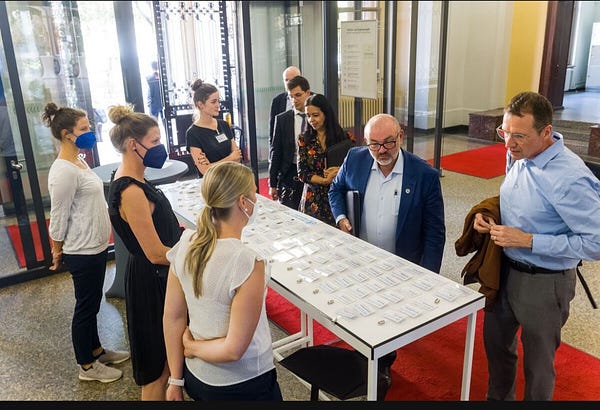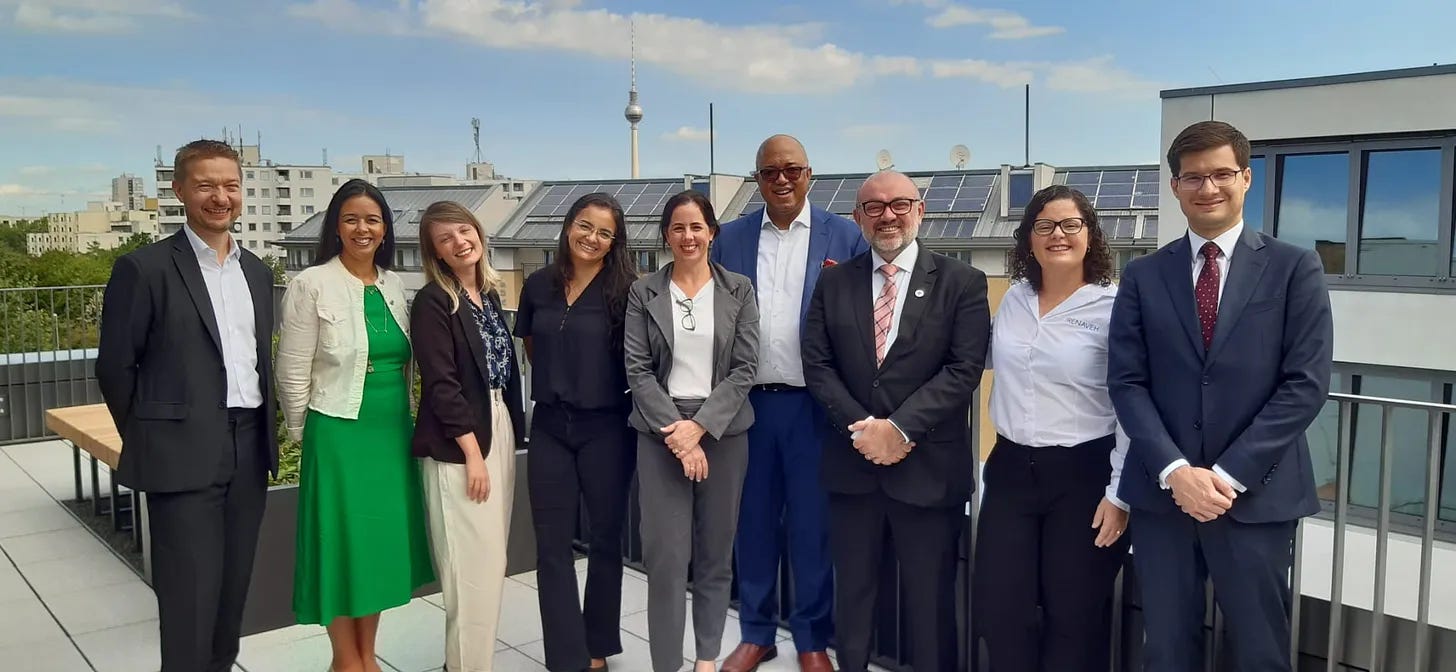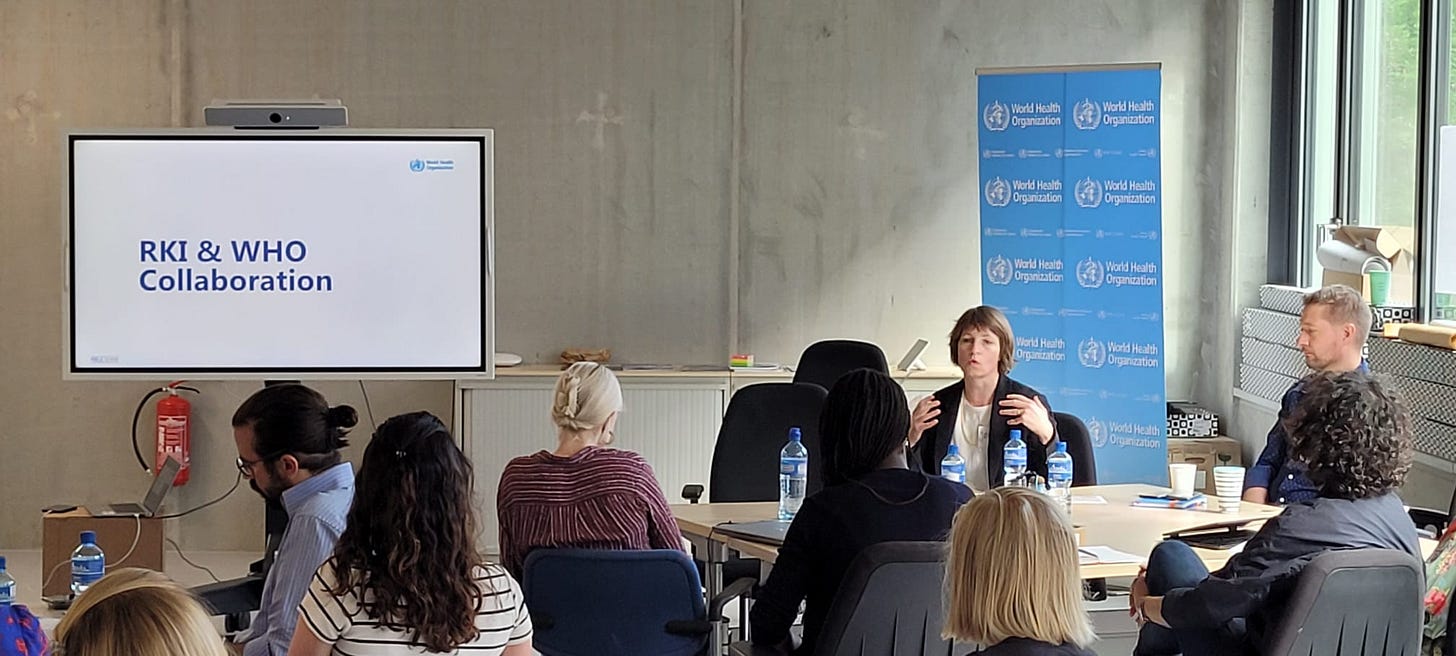In this latest edition of our newsletter, we introduce a new section by the Assistant Director-General for Health Emergency Intelligence and a new collaboration, and we highlight some of our key activities in the last few months.
Notes from Dr Chikwe Ihekweazu, Assistant Director-General
In March 2022, WHO released a 10-year strategy to strengthen genomic surveillance across the world. I contributed to informational videos here and here about the importance of genomic surveillance and WHO’s role. Read more about the Global Genomic Surveillance Strategy for Pathogens with Pandemic and Epidemic Potential 2022-2032.
At this year’s Devex World , I was part of a panel with other global health experts, where I shared our reflections on WHO’s plans for scaling up pandemic preparedness and response. You can watch a replay here.
At the Global Health Security Conference held in Singapore, I joined thousands of colleagues and shared how WHO is strengthening its emergency preparedness and response architecture, as well as our work at the WHO Pandemic Hub.
In July, we hosted a delegation from the Ministry of Health of Brazil. We discussed opportunities for collaboration, especially for the implementation of Epidemic Intelligence from Open Sources Initiative in Brazil and other countries in the Americas.
The Collaboratory
The COVID-19 pandemic has highlighted gaps in the way we access, connect, and process information to generate insights for public health action and decision making. Although many advances in pandemic and epidemic intelligence have been made, the world needs a collaborative space in which to solve complex problems collectively.
The Collaboratory is a WHO Pandemic Hub project that will foster the exchange of knowledge and experience across now fragmented communities. It will provide tools, access to experts, and a collaborative digital work environment that will result in insights that can inform response and policy. We recently met with the Hasso Plattner Institute to discuss a design-thinking approach to the challenges we face as the epidemic and pandemic community.
There are two main components of the Collaboratory: the community and the digital space. The community will include multidisciplinary networks, experts, and the epidemic and pandemic intelligence community. Member States, institutes, academia, and organizations will have a platform that facilitates communication and pools resources and knowledge.
The digital space will help communities of practice share and innovate to support data analytics and scientific reporting. We are currently testing potential open-source platforms and their integration capabilities; we welcome input from stakeholders on requirements. We envisage a flexible system that will evolve over time with a collaborative build ethos.
Responding to the monkeypox outbreak
The WHO Pandemic Hub has been contributing to WHO’s response to the multi-country outbreak of monkeypox. We built the data pipelines and analytic scripts for an online monkeypox Global Trends Report, which provides up-to-date information about the outbreak.
We convene a weekly meeting to discuss monkeypox data and analytics, which facilitates the exchange of information and experience.
RKI/Hub Partnership
The Robert Koch Institut (RKI), which is Germany’s national public health institute, and the WHO Pandemic Hub have established a foundational partnership. This includes an agreement for a bi-annual workplan and budget for activities, as well as a joint approach to governance, oversight, and implementation of projects. We recently held a workshop to review the elements of project management while building strong team relationships.
UPCOMING: EIOS Training of Trainers in Berlin
The Epidemic Intelligence from Open Sources (EIOS) initiative will host the 2022 EIOS Training of Trainers (ToT) workshop in Berlin 19-23 September.
The workshop will teach participants how to deliver training on the EIOS system and public health intelligence, both components of the capacity-building and sustainability strategies of the EIOS initiative and the Pandemic Hub. The goal of the workshop is to ensure that EIOS trainers are well equipped to deliver consistent, high-quality training, including ongoing support to Member States and others adopting the EIOS system.
Target workshop participants are experts from WHO headquarters and regional offices, as well as representatives nominated by the EIOS Coordination Group (EIOS’s governing body) and other external collaborators, who have EIOS experience and agree to deliver EIOS training activities worldwide. The ToT is essential for building and strengthening capacities for the rapid and early detection, assessment, and communication of potential public health threats and risks. Further, a strong network of trainers is key to the continued, sustainable expansion of the EIOS initiative globally.
The workshop follows the successful first EIOS ToT, which took place in August 2019 in Geneva and had a significant impact on the expansion of EIOS implementation. For more information about the EIOS Community of Practice and to see more about the EIOS system training for Member States, visit the EIOS website.
Innovation Forum
We held two sessions of the Pandemic and Epidemic Intelligence Innovation Forum in May and July. 45 colleagues from 25 different organizations joined the May session, which focused on Operationalizing the meaningful aggregation and linkage of data for pandemic and epidemic intelligence, and had presentations by Our World in Data, Johns Hopkins University, and Global.Health.
With presentations from the Nigeria Centre for Disease Control, the UK Health Security Agency, the Korea Disease Control and Prevention Agency, Data.org, and Colombia's Universidad de los Andes and Pontificia Universidad Javeriana, the topic of the July session was Strengthening the epidemic intelligence workforce. 57 participants from 23 organizations discussed how to rethink the composition of a modern public health workforce that can leverage digital opportunities to address challenges in surveillance.
Our Speaker Series
The WHO Pandemic Hub hosted the first session of our quarterly speaker series, Complexity of Pandemics, on 5 July 2022. The goal of the series is to highlight the complex multidisciplinary landscape of preventing, predicting, preparing for, and responding to epidemics and pandemics.
The event was co-hosted with Charité University Hospital and took place at the Natural Science Museum of Berlin, which provided an inspiring backdrop to a conversation on how we can embrace the complexity of pandemics and better align the surveillance efforts of the human, animal, and planetary health sectors for pandemic preparedness and response.
Watch the recording of the first speaker series session here!





We invite you to join the next session, which will take place on 22 September 2022. This session is devoted to highlighting the importance of integrating insights from the social sciences into public health surveillance approaches to better avert and manage epidemic and pandemic risks. Our two speakers, political scientist Professor Michael Bang Petersen and social anthropologist Doctor Julienne Ngoundoung Anoko, present their research and experience in the direct engagement with decision-makers and affected communities during health emergencies. The event will be moderated by Professor Ilona Kickbusch.
COMPLEXITY of PANDEMICS N°2 – Exploring Insights from the Social Sciences for Collaborative Intelligence
22 September 2022, 6:30 pm to 8:00 pm (Central European Summer Time)
PUBLICATIONS
Read our latest publication in Nature Medicine, describing pandemic and epidemic intelligence, how it is implemented, and why it is important. This paper was co-authored with colleagues from WHO’s Regional Offices and represents our collective vision for the future of public health surveillance.






